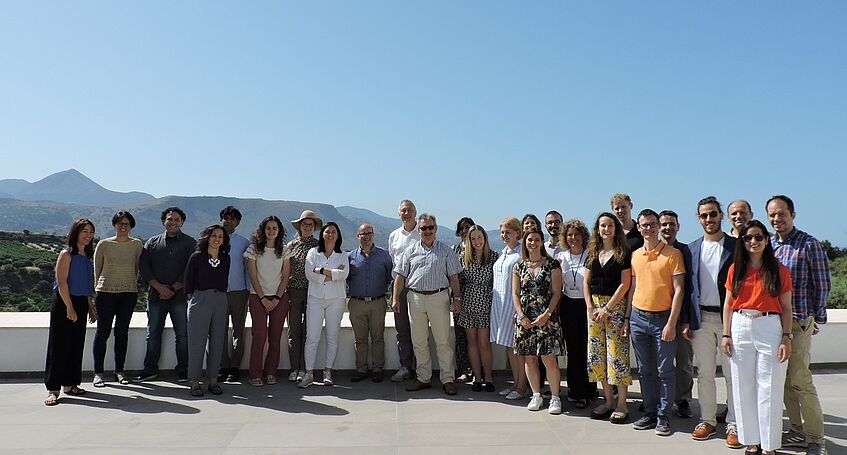A Week on Anonymisation

The ProCAncer-I Consortium Meeting took place for the first time physically in Crete from 23-25 May.
by Theresa Henne
In the last week of May, UNIVIE’s team members working on the ProCAncer-I project travelled across Europe to discuss the topic of anonymisation in health research. Pro-CAncer-I is an EU-funded research project aiming to develop an image repository for AI-driven cancer research. Since patients’ health data is highly sensitive and entails high risks to the fundamental rights of the individual only anonymised patient data is shared within the project. Hence, a sustainable and robust anonymization technique is a critical element of the Pro-Cancer-I project. The concept of anonymisation, however, entails a degree of uncertainty, since it is heavily debated and divergent opinions exist under what circumstances data can be considered anonymised.
To join this conversation, Theresa Henne from the ProCAncer-I project visited the 15th international conference on Computers, Privacy & Data Protection (CPDP) in Brussels taking place from 23-25 May. In addition to an abundance of prominent speakers and high-level panel discussions, the Department of Innovation and Digitalisation in Law of the University Vienna hosted a panel on the topic of “Regulating AI in health research and innovation”. Max Königseder, who formerly worked on the ProCAncer-I project, participated in the panel and presented a risk-mitigation for anonymisation in health research that he developed together with his colleague Emily Johnson supported by Theresa Henne. The conceptual framework builds on the experience of the ProCAncer-I project and introduces the notion that ‘anonymisation is a process’ and lists several steps to achieve sustainable and robust anonymisation over time taking into account the evolution of technical capabilities. Alongside the panel of the Department of Innovation and Digitalisation in Law, several other events addressed issues surrounding health research. For example, the Centre for IP & IT Law of the KU Leuven examined “Secondary use of personal data for (biomedical) research” and addressed the question of how to balance individual rights with public interests when re-using health data for scientific research. Furthermore, a panel on “Sharing the digital me” organised by the Uppsala University, the Cyber Governance project of University Oxford and others dealt with the governance of health and genetic data and the necessary safeguards to foster open science while protecting fundamental rights. The proposal by the European Commission for a legal framework of a European Health Data Space featured frequently on the panels, since it might improve conditions for sharing of health data across the EU for research purposes. The CPDP was not only an opportunity to present the work UNIVIE is currently working on, but also to learn from other initiatives and researchers in the field of health research and, hence, provided valuable insight in the latest academic debates.
Immediately following the CPDP conference, the 4th Pro-Cancer-I Consortium meeting took place from 26-27 May in Crete. The two-day event was devoted to discussing current developments and issues within the research project and to jointly identifying solutions. Coinciding with many technical debates concerning data quality and curation, the uploading process and the development of explainable and trustworthy AI models, also the anonymization process was a prominent topic. The clinical partners, who conduct the first stage of the anonymization process locally, raised the issue that since they cannot re-identify data once it is anonymised they easily lose track of what data is already uploaded. Attributing unique ID tags to the each image file would be a solution to avoid duplicates on the platform. This, however, this would render the data only pseudonymous and not anonymous. Hence, the Consortium agreed that the clinical partners should ensure labelling of the original data sets, distinguishing which data has been uploaded to the ProstateNet and which have not to avoid duplicate uploads. Through this process, clinical partners are also require to remove all ID tags that allow tracking. Thereby, the partners can ensure efficient uploading while keeping data anonymous.
At the end of each day of the Consortium Meeting the hosting organisation FORTH generously invited their partners to taste the local cuisine, which was most appreciated and allowed the members to continue their discussion beyond the scope of the ProCAncer-I project. With the return to Vienna, the week on anonymisation ended for the two young researchers, who inspired by the week of fruitful discussion will certainly keep working on the topic for much longer.
For more information on the topics discussed at the CPDP visit our YouTube Channel!
